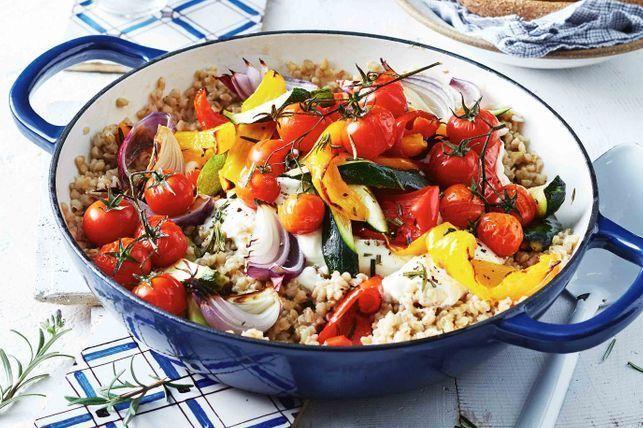What is the Mediterr-Aussie diet? Tips for healthy, long-term weight-loss
Why giving Mediterranean eating a seasonal Australian spin could be the key to both longevity and sustainable weight loss

Why do these diets miss the mark? They don’t encompass ‘real eating’ and therefore cannot be sustained, nor do they educate or teach healthy habits, with research consistently showing that sustainability is one of the most important factors of successful weight management and good health.
The benefits of a Mediterranean diet
Traditional dietary patterns such as the Mediterranean diet have long been recognised and acclaimed for being sustainable, as well as being associated with several impressive health benefits – including weight management, increased longevity, cardiometabolic benefits (reduced risk of cardiovascular disease and type 2 diabetes), and anti-inflammatory properties. They also have a protective role against certain cancers.
The key to the Mediterranean diet’s sustainability? Being a dietary pattern, it’s a way of eating for life, rather than a ‘diet’ as such, and it outlines the types and quantities of different foods that should be habitually consumed, rather than focusing on single nutrients. The Mediterranean diet also looks beyond just diet and advocates the importance of community, eating meals with family, getting adequate rest and physical activity and has a strong emphasis on traditional foods.

Mediterranean diet food… with an Australian twist
Within a modern Australian context, the basic principles of the traditional Mediterranean diet can be adopted and then modified to suit individual needs and incorporate local seasonal Australian produce.
Broadly defined as predominately plant based, the key principle of the Mediterranean diet is eating an abundance of fresh fruit and vegetables, legumes and wholegrains. All of these ingredients are rich in dietary fibre and phytonutrients while being relatively low in energy.
Following a high plant-based dietary intake is not only extremely filling and satiating, but it also supports weight management and protects against chronic disease. This style of diet limits ultra processed and discretionary foods such as fast food, sweets and baked goods, which are high in energy, sugar and/or saturated fat and sodium, and this further supports weight management and overall health.
What about meat, seafood and dairy?
While following a Mediterranean-style diet, red meat and processed meats are also reduced, while seafood, especially oily fish, is increased (two or more serves per week) and lean white meat, eggs and dairy are eaten in moderation. Lastly, extra-virgin olive oil is the main fat in the diet, being rich in heart healthy monounsaturated fatty acids, while nuts and seeds are also consumed regularly.

Try: Mediterranean chickpea salad
How can you eat more Mediterranean in Australia?
Mediterranean-style diets are renowned as one of the best ways support weight maintenance and longevity. But what happens if you don’t live in the Mediterranean? In Australia, we’re lucky to have an abundance of fresh produce on our shores that can help you adopt the principles of the Mediterranean diet, even though you may be thousands of miles away from the region.
Here are my key tips and recipe recommendations to help you embrace the Mediterranean diet across every meal of the day.
- Aim to include at least two vegetarian dinners per week. Looking for inspiration? Try my spiced coconut tofu pumpkin recipe made with beautiful Aussie pumpkins.
- Fill at least half your plate with fruit and veg at main meals.
- Eat meals as a family (or with others) as often as possible and eat at the dinner table, rather than on the lounge, at your desk, in the car or on the run.
- Try swapping half the meat in your favourite recipes such as Bolognese with legumes to boost plant-based protein.
- When choosing animal proteins, incorporate more seafood and reduce red meat (and reduce portion sizes) and limit processed meats as much as possible. This easy Quinoa, salmon and chickpea salad can be made with easy-to-find supermarket ingredients and is ready in just 10 minutes.
- Swap flavoured or fruit yoghurts with natural Greek yoghurt and add fresh fruit for natural sweetness.
- Flavour food with fresh herbs and dried spices instead of commercially made sauces, which are high in sugar and sodium.This Spanish chicken and beans uses harissa and paprika to add extra flavour, and it’s still filling enough for dinner.
- Swap processed carbs such as commercial breakfast cereals with wholegrain oats or barley, white bread for wholegrain sourdough, and white rice for quinoa, bulgur or wholemeal couscous. This easy overnight oats recipe is something you can add to your breakfast routine all year round. Simply add whatever berries or fruit are in season right now.
- Use extra-virgin olive oil instead of butter or margarine when cooking and for drizzling over salad and vegetables.
Originally published as What is the Mediterr-Aussie diet? Tips for healthy, long-term weight-loss


